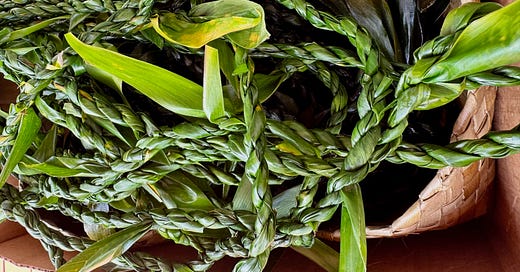Aloha, e komo mai, I invite you to make yourself at home and spend a few minutes with my essay of the week here on Substack. It is a beautiful day in the neighborhood. At the moment my neighborhood is the “Capitol District” in the ahupuaʻa of Honolulu. My hotel is on Bishop Street - referring not to a religious figure, but to the married name of Princess Bernice Pauahi. Whether or not you are in your place of residence, please take a breath and connect to Place, at least make yourself at home in yourself, the landscape of your physical body, the home you carry with you.
My faithful readers know I have spent weeks, months now, writing about Belonging. About belonging through the lens of Place People Power and Purpose. Not coincidentally as these things work, I was invited to participate with a group of organizations coming together for several months to co-create a framework of possibilities and actions around topics of Place and Community. At an in-person gathering this past week we spent many hours in facilitated conversation around ownership, stewardship - People Place Power and Purpose.
What makes poetry possible and communication sometimes nearly impossible is the fact that words have layers of meaning and association. Layers that shift over decades and centuries. Some languages being more layered than others. ʻOlelo Hawaiʻi versus English, for example. Still, the English language has more than enough complexity in some critical words to have us unpacking them for a good long while. Ownership being one of those words.
Remember the distinctions I offered in this post about real estate as “property” versus ʻāina? Real property being a legal concept of enumerated rights conveyed as ownership - and for that contract of sale to be valid there must be “consideration” - meaning even a nominal amount of money, or in the case of a gift conveyance to family members it might be “love and affection.” Property can be bought and sold.
Lately I have been reading historical novels, historical novels with female protagonists making brave decisions in scary times. Like the Civil War for example. Humans were considered property. They could be branded, starved, separated from their families, worked until they dropped, killed for attempting to leave their owner. People could be bought and sold - and still are today in many places and circumstances around the world.
For indigenous-thinking people, people for whom Places are People, are sentient beings, are relations of theirs, the buying and selling of places can feel like a similar violation, a similar assault on the dignity and rights of Place and People. The discussion of “ownership” and variations on “community ownership” of real estate such as the community land trust model, becomes much more nuanced as language and context shift from our accepted capitalistic legal framework and individual property rights.
In ʻāina-based spaces and conversations, one will often hear the ʻōlelo noeau “He aliʻi ka ʻāina, he kauwā ke kanaka.” The land is a chief, the person her servant. You might also say, in right relationship from this perspective, the Place owns People, not the other way around. The Place does not belong to People; the People belong to the Place. This same notion is in the word kamaʻāina - which as we have already discussed does not mean you are a resident entitled to a drivers license and discounts. It means literally and poetically you are a child of the place - with mutual responsibilities rather than rights.
I think about this within our exploration of Belonging1, because we can pay for items that then become our belongings, our property. But can we pay to belong? Does buying a home or renting in a neighborhood mean you belong to that neighborhood, you belong to that community of people?
Residency does not equal belonging. At least for me, there is no equivalence. A residence can be bought, but belonging cannot. Belonging is given by those who already belong; Belonging may need to be earned. Many of us feel a greater sense of Belonging with Places and People far from the Place of our residence, or from our current Place as we travel. And that is a sense of Belonging that entails a positive sense of what it means to own. To own your responsibility. To own your actions and their consequences. To own your own Power in the equation that the dimensions of Belonging are People Place Power and Purpose.2
Which is crazy because for weeks I have been wanting to get back to the topic of what happens when you take ownership in the sense of taking responsibility at different levels. Next time we go there. I promise.
I hope this is OUR exploration and not just MY exploration - that whether you comment here or privately or not at all, we are having a conversation - at least in your head.
Which circles back to Entitlement and Apologies.





Thoughtful and resonant
Yes. This is helpful.
Going inward and upward and deeper, challenging ourselves, feeling honored and grateful when others believe in us enough to challenge us, we’ll transform and be better belongers.
We’ll resist, grumble, stumble, make mistakes. Then we’ll notice our discomfort with our own poor behavior, reflect, apologize and redouble our efforts.
It feels imperative to act with humility, integrity and courage, to devote myself to right action to alleviate suffering caused by injustice, imbuing my energy into our oneness.